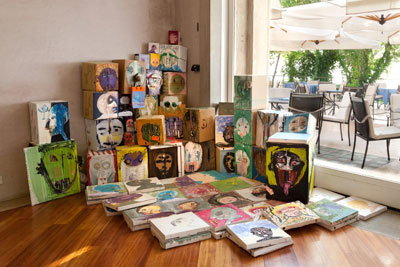ITALY - GASPARE MANOS

Voyage, displacement, exile, flight and return flight: departures and arrivals. These are among the basic ingredients which go into the creative process of Gaspare Manos. The imagination, Guy Davenport wrote, possesses “a history of its own, as yet unwritten, and it has a geography, as yet only dimly seen”. It is into this geography of the imagination that Gaspare blazes his trail through the unexplored territory of recollected sensations, fleeting impressions, the enterprise of ocular testimony which constitutes the painter’s etiquette of memory.
Birthplace records the first inevitable fact of each man’s destiny. It so happened that Gaspare Manos was born in Bangkon, Thailand, instead of Dalmatia or Venice, the secular realm of his ancestors. Perhaps it was the casual parental gift of a large blackboard and colored chalk which decided his fate from the age of three. Soon his days were filled with the evocation of lush impressions gleaned from a car window of exotic street scenes and luxuriant plant forms, images which have remained with him to this day. From an early age he learned to adapt to and to absorb new environments, to be at home with the improbable.
“Perdre, mais perdre vraiment, pour laisser place à la trouvaille”, wrote Guillaume Apollinaire. Displacement implies loss, but also the promise of discovery. Do cities burn behind our backs when we depart, routines of morning suddenly disrupted forever, as our recollections dwindle to their essence, or all too often fade into oblivion? “What thou lovest best remains”, a poet pilgrim to Venice once declared.
Gaspare’s paintings strike the viewer as a transfer of natural facts, through the filter of emotion recollected, in a notation like a musical score offering us the outlines, the contours of the essence of his perception. This goal of the appearance of inevitability is what the writer Peter Handke is referring to when he says he must learn to love single words the way Cézanne did color, the lodestone sought by painter and poet alike. And meanwhile? “To live in the world of creation,” wrote Henry James, “to get into it and stay in it, to frequent it and to haunt it, to woo combinations and inspirations into being by a depth and continuity and meditation: this is the only thing”.
Text by Alan Jones